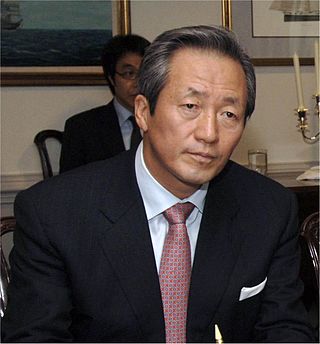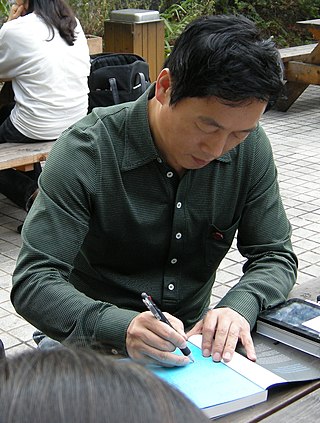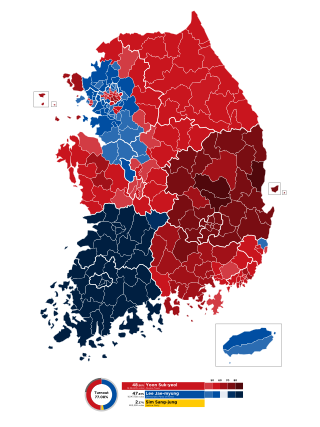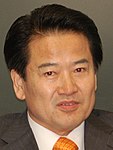The Liberty Korea Party (Korean: 자유한국당) was a conservative political party in South Korea that was described variously as right-wing, right-wing populist, or far-right. Until February 2017, it was known as the Saenuri Party, and before that as the Hannara Party from 1997 to 2012, both of which are still colloquially used to refer to the party. The party formerly held a plurality of seats in the 20th Assembly before its ruling status was transferred to the Democratic Party of Korea on 27 December 2016, following the creation of the splinter Bareun Party by former Saenuri members who distanced themselves from President Park Geun-hye in the 2016 South Korean political scandal.

Presidential elections were held in South Korea on 19 December 2002. The result was a victory for Roh Moo-Hyun of the ruling Millennium Democratic Party, who defeated Lee Hoi-chang of the Grand National Party by just over half a million votes.

Chung Dong-young is a politician and was the United New Democratic Party nominee for President of South Korea in 2007.

Park Geun-hye is a South Korean politician who served as the 11th president of South Korea from 2013 to 2017, when she was impeached and convicted on related corruption charges.

Lee Hoi-chang is a South Korean politician and lawyer who served as the 26th Prime Minister of South Korea from 1993 to 1994. He was a presidential candidate in the 15th, 16th and 17th presidential elections of South Korea. Prior to his presidential campaigns, Lee served as Supreme Court Justice of the Supreme Court of Korea.

Lee Myung-bak often referred to by his initials MB, is a South Korean businessman and former politician who served as 10th president of South Korea from 2008 to 2013. Before his presidency, he was the CEO of Hyundai Engineering and Construction, and the mayor of Seoul from 2002 to 2006.

Chung Mong-joon or Chung Mong Joon is a South Korean businessman and politician. He is the sixth son of Chung Ju-yung, founder of Hyundai, the second-largest South Korean chaebol before its breakup in 2003. He remains the controlling shareholder of a Hyundai offshoot, Hyundai Heavy Industries Group, parent of the world's largest shipbuilding company. He is also the chairman of the board of the University of Ulsan and Ulsan College in Ulsan, South Korea. He is the founder and the honorary chairman of The Asan Institute for Policy Studies. He was Honorary Vice-president of FIFA and president of the South Korean football association.

The Grand Unified Democratic New Party was a political party of South Korea. It was formed out of the Uri Party and its resulting splinter groups. Chung Dong-young was the party's candidate in the 2007 South Korean presidential election; he lost to Lee Myung-bak. On February 17, 2008, the party merged with the Democratic Party to form the United Democratic Party.

Creative Korea Party was a political party of South Korea. It was formed out of the Uri Party and its resulting civil splinter groups, with their leader Moon Kook-hyun, a well-known former business leader who recently started his political career. Their 2007 presidential bid was unsuccessful, however, they gained 3 seats at the 2008 general election on April 9, 2008, including the election of Moon Kook-hyun at Eunpyeong-eul, Seoul district; but lost all of these seats in the subsequent 2012 general election. Creative Korea Party deregistered on 26 April 2012.

The Lee Myung-bak government was the fifth government of the Sixth Republic of South Korea. It took office on 25 February 2008 after Lee Myung-bak's victory in the 2007 presidential elections. Most of the new cabinet was approved by the National Assembly on 29 February. Led by President Lee Myung-bak, it was supported principally by the conservative Saenuri Party, previously known as the Grand National Party. It was also known as Silyong Jeongbu, the "pragmatic government", a name deriving from Lee's campaign slogan.

Legislative elections were held in South Korea on 11 April 2012. The election was won by the ruling Saenuri or New Frontier Party, which renewed its majority in the National Assembly, despite losing seats. The election was read as a bellwether for the presidential election to be held later in the year. The result confounded exit polls and media analysis, which had predicted a closer outcome.

Presidential elections were held in South Korea on 19 December 2012. They were the sixth presidential elections since democratization and the establishment of the Sixth Republic, and were held under a first-past-the-post system, in which there was a single round of voting and the candidate receiving the highest number of votes was elected. Under the South Korean constitution, a president is restricted to a single five-year term in office. The term of the then incumbent president Lee Myung-bak ended on 24 February 2013. According to the Korea Times, 30.7 million people voted with turnout at 75.8%. Park Geun-hye of the Saenuri party was elected the first female South Korean president with 51.6% of the vote opposed to 48.0% for her opponent Moon Jae-in. Park's share of the vote was the highest won by any candidate since the beginning of free and fair direct elections in 1987 and the first such election in which any candidate won a majority. Moreover, as of the 2022 election, this is the latest South Korean presidential election in which the winning candidate won an absolute majority of the vote.
The two South Korean 2011 by-elections took place on April 27, 2011 in 38 electoral districts across the country and on October 26, 2011 in Seoul after Oh Se-hoon resigned due to his failure in the Seoul Free Lunch Referendum.
Lee Sang-don is a South Korean legal scholar and a conservative liberal political activist. His liberal philosophy was influenced by American conservatism and neoconservatism, but he is critical of South Korean conservatism. He currently works as a professor at Chung-Ang University. He is a conservative pundit well known for expressing criticisms towards the Lee Myung-bak government. He received criticisms from a group of pro-Lee Myung-bak lawmakers for participating in the restructure of the Saenuri Party in the past due to his distance with Lee Myung-bak.
During the 2007 South Korean presidential election, there were allegations made about presidential candidate Lee Myung-bak's relationship with a company called BBK. In 1999, Lee would meet Kim, with whom he established BBK and the LKE Bank. Their business enterprise went bankrupt less than a year later. Kim was investigated for alleged involvement in the massive embezzlement and for alleged stock price-manipulation.

Early presidential elections were held in South Korea on 9 May 2017 following the impeachment and removal of Park Geun-hye. The elections were conducted in a single round, on a first-past-the-post basis, and had originally been scheduled for 20 December 2017. However, they were brought forward after the decision of the Constitutional Court on 10 March 2017 to uphold the National Assembly's impeachment of Park. Following procedures set out in the Constitution of South Korea, Prime Minister Hwang Kyo-ahn succeeded Park as the acting president. After Park was removed from office by the Constitutional Court's ruling, acting president Hwang announced he would not run for a term in his own right.
The 2017 People's Party presidential primaries were a series of electoral contests organized by the People's Party to determine the nominee for President of South Korea in the 2017 South Korean presidential election. The races took place within all nine provinces and eight metropolitan cities of South Korea between March 25 and April 4, 2017. Regardless of party membership, any South Korean citizen over the age of 19 by the election day could vote as long as they showed up on the day of the primary race with a photo ID. These primary results were weighted as 80% of the final result, and the two polls that were conducted by two private poll firms were weighed as 20% of the final result. The candidate who won the absolute majority of the votes would win the nomination, and a runoff ballot was scheduled to be held in case no candidate reached the magic number by the convention day. The People's Party nominee challenged other presidential candidates in the presidential election to fill in the vacancy caused by the impeachment and removal of President Park Geun-hye.

Kim Dong-yeon (Korean: 김동연; Hanja: 金東兗; born 28 January 1957) is a South Korean politician, who is currently the 36th governor of Gyeonggi Province since 1 July 2022. He previously served as the 4th Minister of Economy and Finance and Deputy Prime Minister from 2017 to 2018.

Chung Bong-ju is a South Korean politician and the former Member of the National Assembly for Nowon 1st constituency from 2004 to 2008.

Presidential elections were held in South Korea on 9 March 2022. Under the South Korean constitution, presidents are restricted to a single five-year term, meaning that incumbent president Moon Jae-in was ineligible to run for a second term. Opposition candidate Yoon Suk Yeol of the People Power Party won the election, defeating candidate Lee Jae-myung of the incumbent Democratic Party.





















